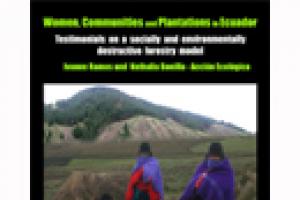The Muisne canton, province of Esmeraldas hosted the “First Meeting: Women of the Mangrove Ecosystem of Ecuador, our dreams, our rights, our challenges,” held in May this year.
Ecuador
Bulletin articles
30 July 2009
Bulletin articles
30 May 2009
In Muisne, on the Northeast coast of Ecuador, the inhabitants have developed a lifestyle adapted to mangrove ecosystems, based on fishing and gathering shellfish and crabs. However, their livelihood has been under threat since the eighties, when shrimp farming started expanding in the region (WRM Bulletin nº 51, October 2001).
Bulletin articles
30 January 2009
Yasuní National Park stretches along the basins of the Yasuní, Cononaco, Nashiño and Tiputini Rivers. Aside from the fact that these are major rivers in their own right, they are also surrounded by floodplains, wetlands, lagoons and lake systems like the Jatuncocha, Garzacocha and Lagartococha. This area is also the ancestral territory of the Waorani indigenous people and two indigenous tribes living in voluntary isolation, the Tagaeri and Taromenane.
Bulletin articles
25 November 2008
On 15 October, the President of the Republic, the Economist Rafael Correa Delgado, and four Ministers of State issued Decree 1391 regulating industrial shrimp farming.
Publications
22 October 2008
By Ivonne Ramos and Nathalia Bonilla
Testimonials on a socially and environmentally destructive forestry model
Joint Research of Acción Ecológica and WRM
Women, Communities and Plantations in Ecuador
Other information
28 April 2008
The Constituent Assembly formed to discuss and draft a new Ecuadorian Constitution resolved on 14 March 2008 to grant an amnesty to 357 human rights activists who had been “criminalized for their protest and resistance actions in defence of their communities and the environment,” according to an official press release. Most of the 357 are community and peasant leaders, some of them indigenous, from communities throughout the country.
Bulletin articles
28 April 2008
The Palmeras del Ecuador Company was established in the Ecuadorian Amazon, in the Province of Sucumbios, Shushufindi Canton, at the end of the seventies.
The former Institute for Agrarian Reform and Settlement (Instituto de Reforma Agraria y Colonización - IERAC) granted a concession to the company of 10,000 hectares of land, considered to be “waste land,” deliberately ignoring that these were ancestral lands of the Indigenous Siona and Secoya peoples and nationalities. This led to their almost complete extermination because of the occupation of their lands.
Bulletin articles
3 January 2008
At the end of 2007, the Peruvian government opened the way to the exploitation of new oil plots in the Province of Loreto, on the frontier with Ecuador: plots 67 and 121 to the US Barrett Resources Corporation and plot 39 to the Spanish company Repsol YPF.
Other information
5 December 2007
The Summit of Communities Criminalized for Defending Nature was held last November in Quito, Ecuador. Criminalization is part of a strategy aimed at silencing any protest against the extractive activities of transnational corporations within Ecuadorian frontiers. It would seem that the next accused could be anyone. It is sufficient to raise your voice against the irrationality of global economy.
Bulletin articles
17 October 2007
Intag, the subtropical anti-mining area in the northwest of Ecuador will not find 26 September 2007 an easy day to forget. After months of waiting for a resolution on the issue, the Ministry of Mines and Oil announced suspension of mining activities of Ascendant Copper, the Canadian mining company owner of the concessions in the area. The legal base for Minister Galo Chiriboga’s decision is that the company breached the law when it launched its work, because it had not requested the corresponding authorization and reports from the Municipality of Cotacachi.
Bulletin articles
18 July 2007
On 27 April 2007, following a visit to the Amazon region, the President of the Republic, Mr. Rafael Correa decreed a ban on timber extraction from this area because of the imminent disappearance of the country’s native forests. In spite of this declaration, the extraction of cedar wood in the Yasuni National Park (YNP) and in the Intangible Zone continues non-stop.
Other information
19 June 2007
Through various programmes and state incentives, under the auspices of international cooperation agencies, monoculture tree plantations of fast growing species have been established in the three continental regions of Ecuador and are rapidly becoming widespread, generally destroying primary ecosystems.

